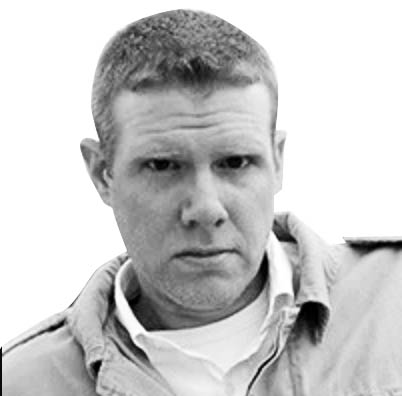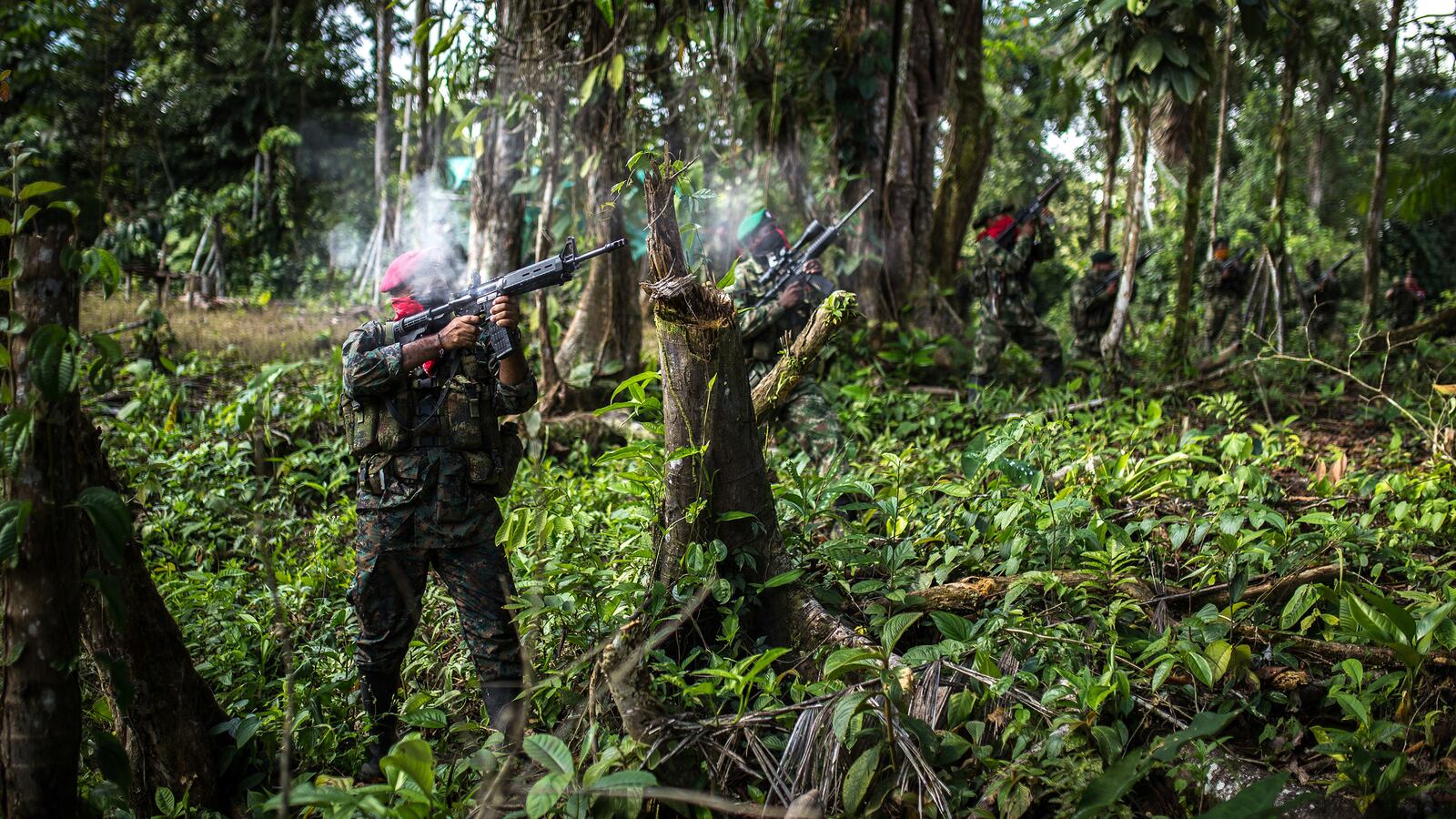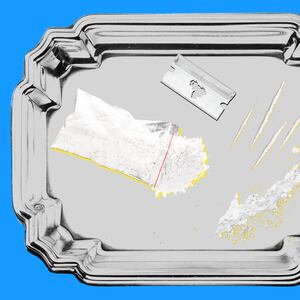CALI, Colombia—Comandante Uriel is the leader of the “Western War Front” of the National Liberation Army [ELN], which the U.S. State Department has designated a narcotics-trafficking and terrorist organization. He keeps a low profile behind his nom de guerre (identified with an apocryphal archangel who watched over thunder and terror). And he spoke with The Daily Beast from his jungle base in Colombia using encrypted voice and text messages. But there are some things he definitely wanted to say.
The ELN is now the oldest insurgency in the world, its struggle well into its sixth decade, and it’s steeped in the Marxist-Leninist rhetoric that one might associate with the revolutionary icons of yesteryear. Its fighters have been called "the last of the Cold Warriors." But at this moment of international uncertainty and upheaval, Comandante Uriel wants to believe the revolution’s hour has come round at last—that people the world over will embrace its message, even if its dogma and boilerplate are older than Lenin’s tomb.
For those not familiar with the history of revolutionary promises and revolutionary failures, it's worth listening to what he has to say, then considering what he does not say.
At the end of our interview, Uriel wanted to make sure we talked about the George Floyd protests, clearly hoping he could strike a chord with some parts of the North American public.
“We support the signs of outrage that are now taking place in the United States,” Uriel said. “We know that the trigger was the outrageous death of a black man at the hands of the police of that country. But we also know [George Floyd’s death] had its roots in racism, segregation, xenophobia, exploitation, and the patriarchal system. The indignation of U.S. citizens is just and necessary and so allows them to rise up with dignity."
That much is hard to deny.
“Our struggles are one,” the comandante claimed. “As a national liberation army, we also fight to defend the lives of [Afro-Colombian] blacks, indigenous people, mestizo, campesinos [rural laborers and small farmers], and urban populations. And we swear to win!”
OK. Victory in Colombia, if it comes at all, is not likely to come soon. But the ELN’s defeat is not imminent either. And meanwhile, despite decades of armed struggle by Marxist partisans—and decades of mainstream politicians promising change with U.S. support—the country remains one of the most economically unequal in the world.
A 2016 peace agreement between the government and another, larger group, the Revolutionary Armed Forces of Colombia [FARC], left the ELN as Colombia's biggest active rebel organization, and when about a third of the FARC’s fighters rejected the armistice, many allied with the ELN, further swelling its ranks.
The ELN’s own peace talks with the government collapsed in 2019, and since then it has set out to show it remains capable of nationwide attacks that can cripple infrastructure and transportation on a wide scale. It declared a coronavirus-inspired ceasefire last month, but after that ended, its operations picked up. So did government retaliation, including airstrikes in May that left at least 20 ELN fighters dead.
We put it to Uriel that there have been many other revolutionary movements in Latin America—with the Castros in Cuba and the Sandinistas in Nicaragua being the best known—that spoke in flowery rhetoric that sought to justify bloodshed. But they either failed outright to achieve their goals, or rose to power only to succumb to corruption and authoritarianism. And in Colombia, guerrilla conflicts never seem, truly to be resolved. (One of the most recent photos of Uriel without a mask, published below, was taken 22 years ago.)
“How is the ELN different?” we asked. “And what is your ultimate goal?”
“Our objective is socialism,” said the comandante.

Uriel (L), commander-in-chief of the fourth block of rebels, with other leftist guerrillas, speaks to the press by hand radio, in the jungle of Miraflores, 300 km southeast of the capital, Aug. 7, 1998.
ReutersHe’s not talking about Bernie Sanders’ version of socialism, although one might get that impression at first glance. He’s talking about “socialization of the means of production and reduction of the inherent inequality that we live under in this country. We fight so that each person might have the same rights, the same opportunities. The chance to live with dignity, with access to health care, education, productive leisure, art and culture.”
And it gets better, embracing worthy contemporary causes that never much interested revolutionaries of this genre in the past: “Our ultimate strategic objective is to reach a stage of society that has done away with various forms of oppression, of exploitation. We understand that a new ecological awareness is necessary to live in balance with the environment. Patriarchy, even older than class society, is another burden that we must overcome in order to unleash the capacities of women as a force for revolution.”
Then comes the crucial caveat. “We’re also aware that this utopia is not just around the corner. A transition stage is needed during which our country can be democratized, recover national sovereignty, overcome corruption and other evils. Until that happens, structural changes will be almost impossible.”
It’s that transitional phase, that Marxist-Leninist “dictatorship of the proletariat” where victorious revolutions get stuck. Typically, the evils of the defeated classes are embraced by the new one.
The United States has classified the ELN as a terrorist organization, noting its record ambushing military units, attacking police stations, blowing up oil pipelines, and kidnapping civilians. How does the ELN respond to the terrorist classification?
Comandante Uriel: We are not terrorists. We are revolutionaries.
We know that the U.S. government makes these [terror] lists worldwide as a strategy of fear. They need to create enemies everywhere to justify aggression, to plunder and pillage [other nations].
After 9/11 in 2001, the supposed “War on Terror” became a Pandora's box, the omnipresent solution to greenlight aggressive acts anywhere in the world, usually with a clear economic incentive in the background.
We stand up and hold ourselves to the right to rebellion as [it is understood] by human rights groups that say, more or less, that when national governments are illegitimate and do not look after the interests or well-being of their people, then the people have the right to rise up, even in arms, to claim those rights. The ELN is an organization of the Colombian people, made up of men and women who are dissatisfied with the inequality and inequity that reigns throughout the world.
How numerous are these revolutionaries fighting to transform Colombia, a nation of some 50 million people? According to recent estimates, the ELN has grown about eight percent since 2018 and currently has about 2,400 fighters.
Uriel: Exact figures are not made known even to the command set. Only the Central Command has such data and it is considered a war secret. All the related figures seen in the media are just pure speculation.
In fact, those who would be the vanguard of their revolutions are rarely numerous, but they hope eventually to inspire popular uprisings. The history of Colombia may have made that more difficult. For roughly a decade from 1948 to 1958 the country was racked by a civil conflict among the traditional Liberal and Conservative parties that degenerated into such savagery it became known simply as La Violencia. Hundreds of thousands of people died, often killed in grotesque ways. In the 1960s, despite the fervor inspired by the Cuban revolution, few Colombians wanted a new war.
We wondered how the ELN has evolved over the last six decades
Uriel: The first guerrilla march was on July 4, 1964. It is the milestone that we consider the birth of the ELN. The ELN has changed a lot since then, as has Colombian society. Over the years we have understood various things, and we have evolved in revolutionary theory and practice. Now, for example, we are strongly united by issues of diversity and gender equality. We know that the feminist, anti-patriarchal, anti-racist and anti-capitalist struggles are all necessary to achieve the true transformations that are needed.
But there are things that remain unchanged throughout all these decades. Love for the people, for the exploited majorities. And the awareness that only the people can save the people. The spirit of sacrifice, the will to change, and the Leninist principles of our organization.
Colombia will receive about $200 in military aid from the U.S. in 2020, despite concerns about issues like the army carrying out extrajudicial killings and intelligence agencies spying on journalists. Meanwhile foreign investments in mining, oil, and other sectors rose by 29 percent so far this year, with U.S. companies leading the way.
Uriel: The interference of the U.S. government in Colombia is overwhelming. Bogotá is on its knees to the interests of the American empire and this is shown in that it supports all of [Washington’s] international policies in Latin America, even at the cost of the sovereignty of sister countries....
The Liberator Simón Bolívar said, "The United States seems destined by providence to plague America with misery in the name of freedom."
Colombia is now the world’s leading exporter of cocaine, producing 80 percent of global supply. Cocaine use and overdoses are up in the U.S. But growing coca (the plant that forms the main ingredient of cocaine) is the only way for many impoverished farmers to survive.
Uriel: The coca farmer is treated and penalized as a drug trafficker. Yet he is the weakest link in a lucrative economic chain. He is the one who earns the least and is the most repressed.
It is the government’s abandonment of the Colombian countryside which has led to coca crops being the only profitable alternative. These places are almost inaccessible, without paved roads or transport routes. So that no other crop or product is able to compete in the market. Growing the [coca] leaves is not a great profit for the farmers, but it is the only product that pays enough to live on.
Bogotá and Washington both claim that the ELN increasingly profits from the cocaine trade, and independent studies as well as eye-witness accounts indicate it is allied with major traffickers. Does filling ELN coffers with narcotics revenue clash with its stated goals for a more just and noble society?
Uriel: We are not drug traffickers. ELN’s position regarding trafficking is categorically demarcated. We recognize the phenomenon as a Colombian reality. The ELN collects tax on all economic activity that takes place in the areas where we are present—be it the legal or illegal economy. We have no exports, [smuggling] routes, etcetera. We only charge tax.
Colombian intelligence officials say that about 45 percent of ELN fighters are based in Venezuela, where they receive protection from the Bolivarian government originally founded by socialist President Hugo Chávez. We asked if current Venezuelan President Nicolás Maduro, whom the United States is working to force out of office, is an ELN ally.
Uriel: The ELN was born in the mountains of Santander in Colombia [near the Venezuelan frontier]. We have been operating in the border region for more than 55 years, long before Chávez and Maduro arrived...
We feel affinities and sympathies with the progressive politicians promoted by Hugo Chávez, and their fight against neoliberalism and North American imperialism. And Maduro is continuing many of those policies. The Venezuelan government is not an ally of the ELN, but we do have some ideological coincidences.
The ELN pulled off a major, nationwide offensive earlier this year, with over 100 separate attacks across Colombia. What were the military objectives behind that campaign? What did the ELN hope to achieve?
Uriel: The strike was guided by political objectives [and] to denounce state violence and state terrorism, such as the strategic creation of paramilitary groups and the genocide of social leaders, the killing of those who think differently, the use of bullets to solve political differences with unarmed people... For now the struggle must go on.





